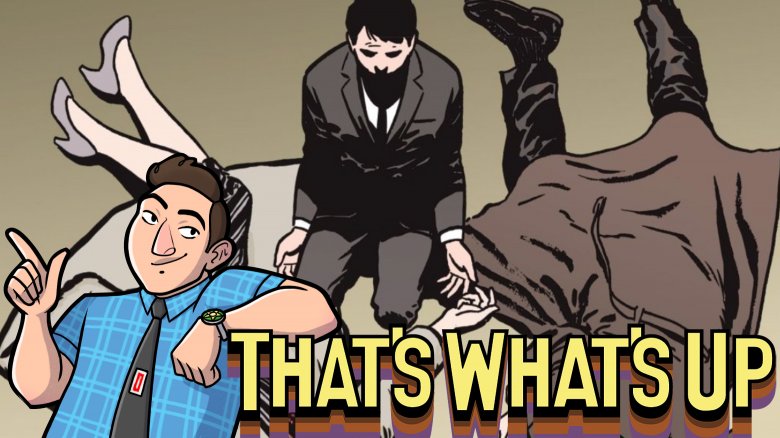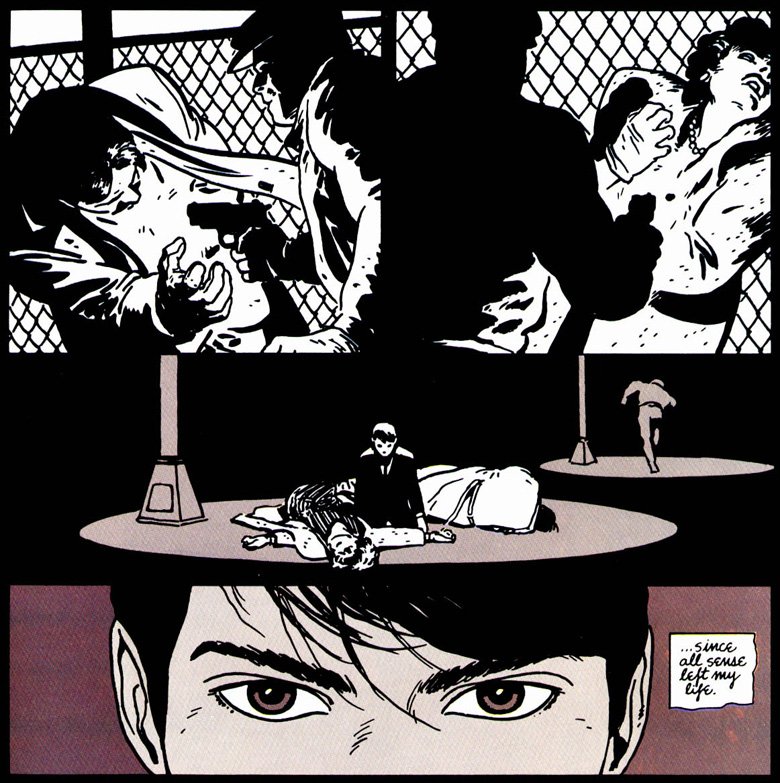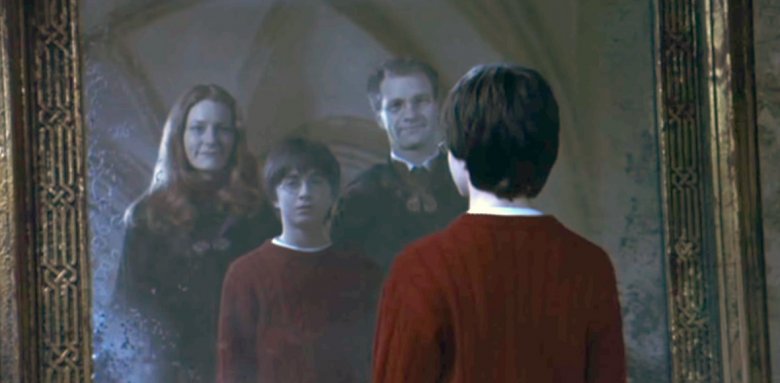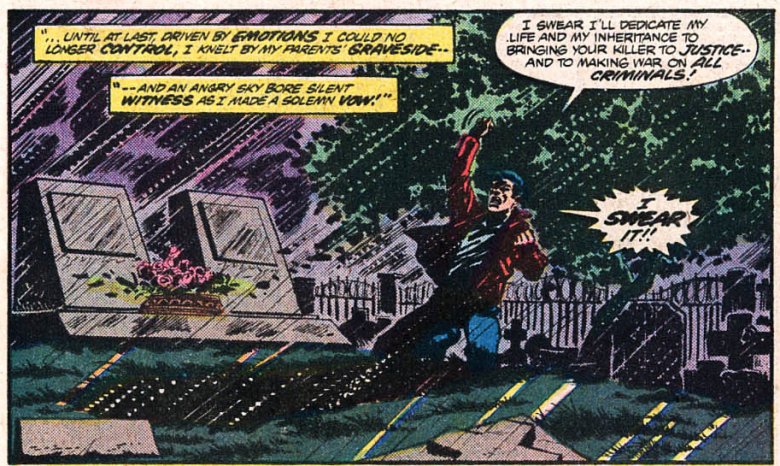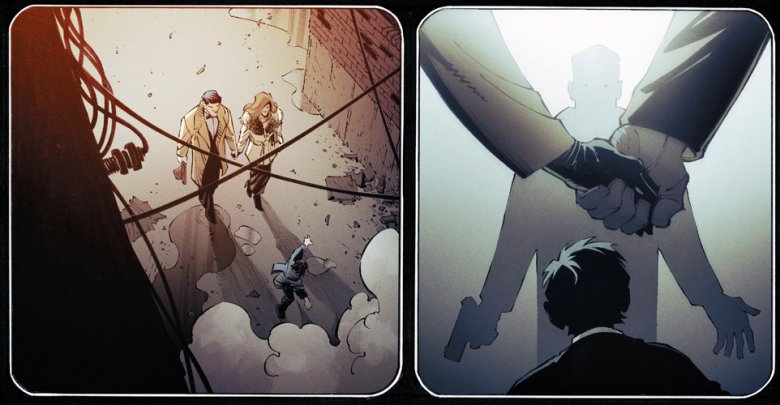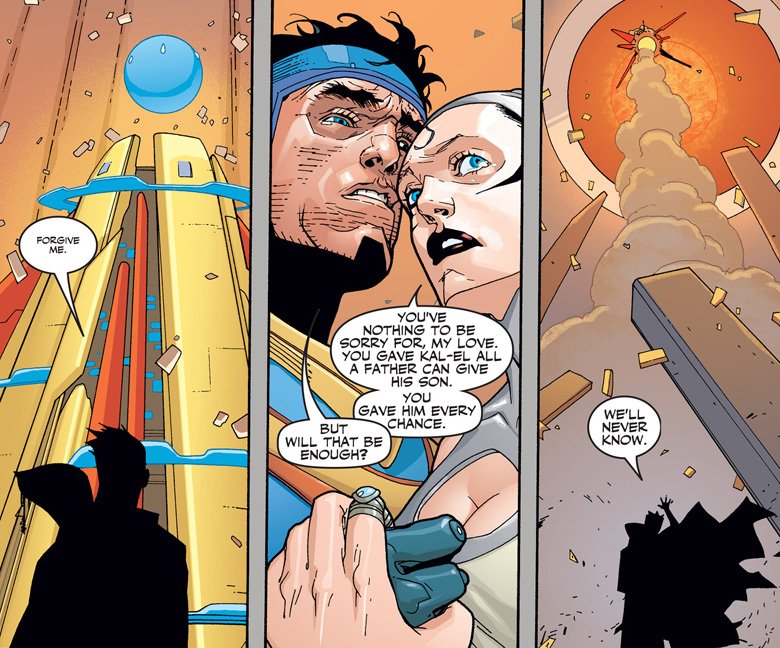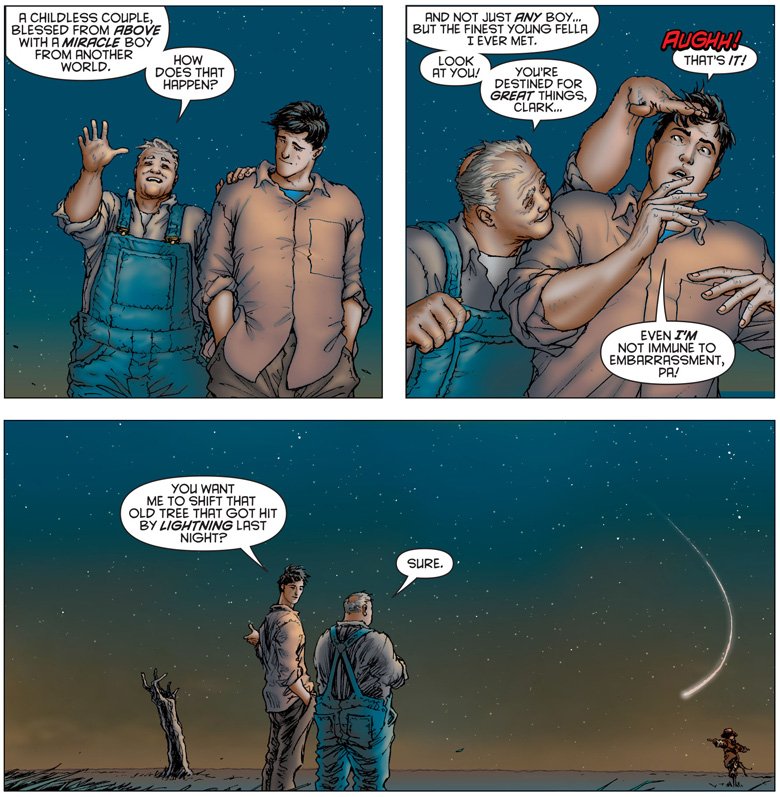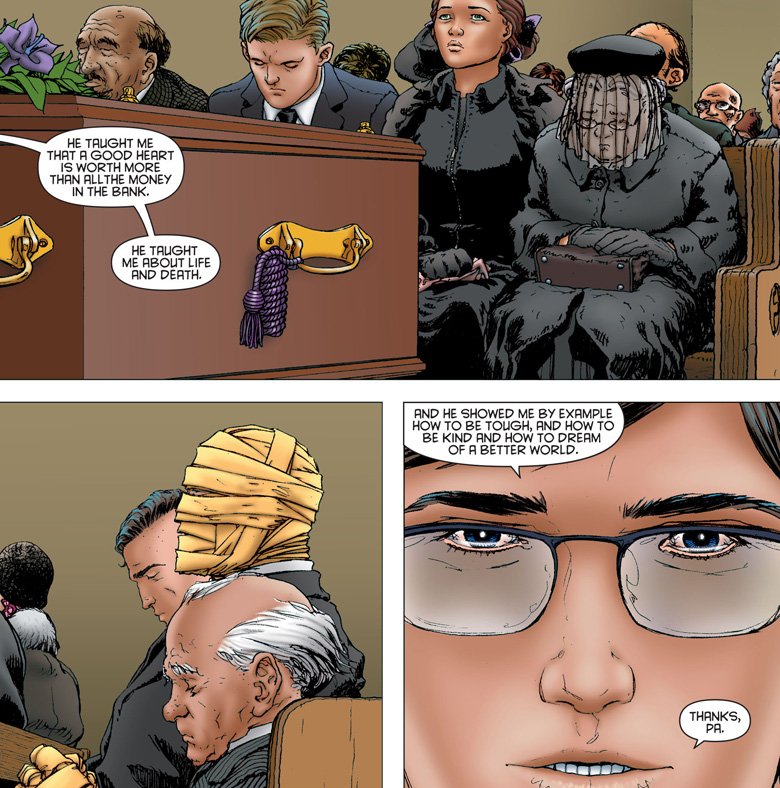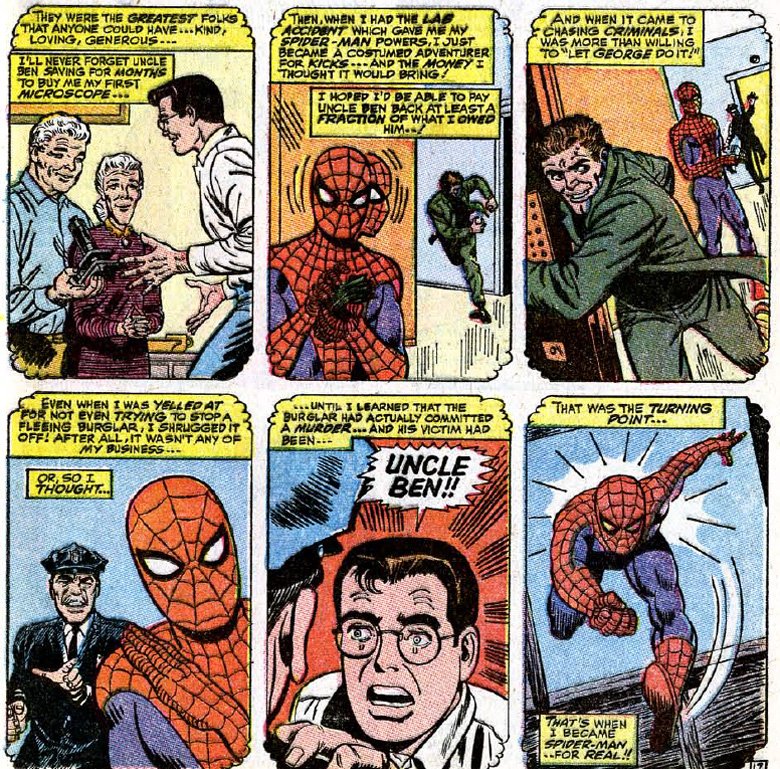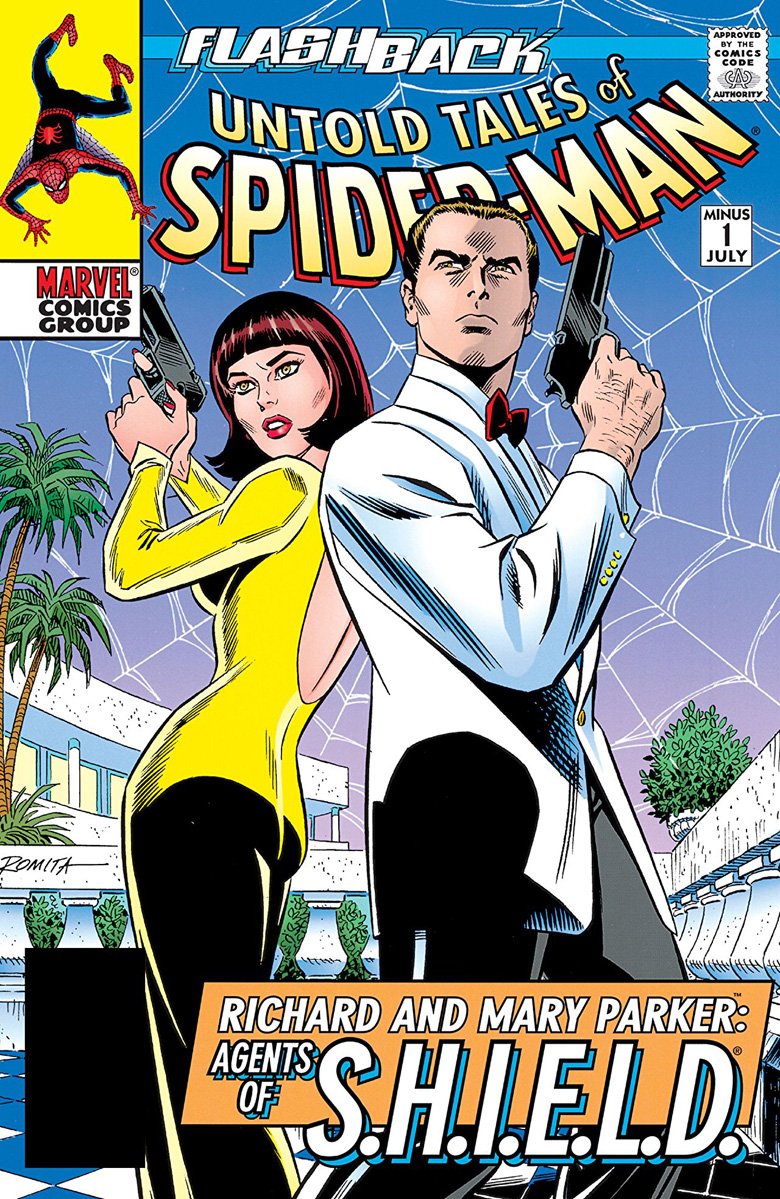That's What's Up: Why So Many Superheroes Are Orphans
Each week, comic book writer Chris Sims answers the burning questions you have about the world of comics and pop culture: what's up with that? If you'd like to ask Chris a question, please send it to @theisb on Twitter with the hashtag #WhatsUpChris, or email it to staff@looper.com with the subject line "That's What's Up."
Q: Why do so many superheroes have dead parents? — @YellFeat
Whenever my wife and I talk about the possibility of having children someday, there's one hard and fast rule that I will not budge on: we are never taking that kid to see a movie. Sorry, little Dracula—what? It's a great gender-neutral name—but you're going to have to stick with Netflix until you're in college. I have read too many comics to run the risk of taking a wrong turn down Crime Alley and accidentally winding up creating a protagonist.
But despite the fact that it's given me a perfectly reasonable fear about becoming someone else's motivating tragedy, the idea that so many superheroes take their first step towards heroism over the dead bodies of their parents is one that I find really fascinating.
Tragic motivations
Like a lot of things that have become reliable tropes over the years, there's a simple reason you see this so much in superhero comics: it's one of the most relatable tragedies a character can go through. It's something everyone can understand, especially children.
In real life, relationships between relatives can often be a lot more complicated than the generalizations that influence our fiction, but on a very practical, literal level, we all have parents and, generally speaking, most kids are completely reliant on them for... well, everything. They're the source of food, shelter, and pretty much everything else you have when you're a child, which is why they're such an easy shorthand to use in literature. Everyone, even people who didn't grow up with their parents, can understand the idea of them and what they represent.
They're safety, they're love and comfort, they're the very concept of order. They're home. Take them away, and all those things go with them. And that's the sort of thing that can provide a hell of a motivation to get out there and do something about it.
It's not just comics
That's not just something you see in comics, either. It's an element of all sorts of adventure stories, and has been since long before Krypton exploded and Joe Chill pulled the trigger on the Waynes. But even if we separate it from its long legacy, it's everywhere.
Just off the top of my head, Harry Potter's an orphan. James Bond is an orphan. Luke Skywalker thinks he's an orphan, which sets up one of the biggest reveals in pop culture. That one in particular is notable because the entire reason it works so well is that it subverts the traditional story we've seen a million times, where the plucky young protagonist is out for revenge against the person who killed his parents. The trick, of course, is that the bad guy is his father, and that's not only a really good piece of drama, it also teaches impressionable young viewers a good lesson about how you can't rust everything that you hear from a weird old cave wizard. Anyway.
Luke and Harry both show another important aspect of what parents represent in fiction: they're a character's connection to their family, and to the larger world in which that family exists. Taking them away severs that connection, and in a lot of stories, the character's entire journey is about getting it back. Luke's entire motivation in the first two Star Wars movies, for example, is summed up when he says that he wants to "become a Jedi, like my father," something that comes full circle in the third movie when "I want to" is replaced with "I am."
For Harry Potter, the connection to his family is severed so profoundly that it shuts him out of their entire world, and takes away the very idea of what a home is. He grows up in a house full of close relatives, but it's a place where the concept of comfort and safety are completely alien. One of the big moments in that series is when Harry finds out that his parents weren't perfect—and that his dad was, in fact, kind of a complete jerk—but the life he's experienced as a direct result of their absence is so miserable, it doesn't diminish his personal tragedy of being orphaned at all. In growing up without parents, he grows up without everything they represent, and it's not until he winds up at Hogwarts that he truly experiences what it's like to belong somewhere, which is one of the many reasons why the epilogue where he becomes a cop instead of a teacher feels so weird.
But that's something we'll have to get into another time.
Loss and vengeance
Point being, this idea is certainly not limited to the superhero genre, but I do think superhero comics deal with it in some pretty interesting ways—and the one bright side about people dropping like flies as soon as their children are able to understand the concept of loss is that we have plenty of examples to work with. That said, I think it's important that we start with Batman, and not just because my natural inclination is to always start with Batman.
One of the most interesting things about the way the Dark Knight has changed over the years, and one that I think can never really be overstated, is that when he was originally created as Bill Finger and Bob Kane's knockoff of the Shadow, the death of the Waynes wasn't a part of the formula. It comes six months later, in Detective Comics #33, when they start taking their first step at figuring out what's going to make Batman stand out among the crowded newsstands that exploded with cape characters once everyone saw how much money National was making with Superman.
One of the key ideas of the Wayne murders is that they're rich, and while part of that comes from the fact that Finger and Kane had already introduced Bruce Wayne as a wealthy socialite in the vein of Lamont Cranston, it's also a pretty interesting piece of the puzzle. Batman debuted, after all, at the tail end of the Great Depression, when stories about rich people were spiking in popularity as escapist fiction. The idea that even a massive family fortune couldn't protect the Waynes from being murdered in a random act of street crime, that this sort of violence could strike anyone, is a huge part of what makes Batman work. And while it's sparked decades of completely nonsensical debate about whether Bruce Wayne could be doing better things with his money than buying rocket cars and batarangs if he really wanted to eliminate the root causes of crime, I really love the idea that he uses his family's legacy to directly attack the thing that killed them.
It's more than losing people, it's losing everything
I'm not sure I buy it—I'm of the mind that Batman's personal fortune is more of a plot convenience than anything else, since it's fun to read about a guy who can afford to have a personal jetpack if he needs one—but there's also this idea that the Waynes' wealth magnifies the loss. Their massive mansion essentially becomes a tomb, an empty monument to what Bruce has lost that's way too big for an eight year-old and his loyal butler. The money is a constant reminder that for all they had, they couldn't stop a pair of bullets, and their presence as a prominent family in Gotham City serves as a testament that all they did through business and philanthropy couldn't stop their hometown from becoming a place that's constantly being attacked by a murder clown and a crossword robber.
Again, there's an idea of a connection being severed, both from the things that love you and the things that you love yourself. I really love the idea that Batman can't even watch his favorite movie after this, because two shots in an alley ruined everything about his life—even if it left him as an heir to a considerable fortune with a photographic memory and a manservant who is basically a dad that he can boss around if he wants to, which might just be every child's greatest fantasy.
And of course, it's also important that this happens when Bruce is a child. The death of a parent can be a devastating loss even as an adult, but once you're old enough to be reliant on yourself, you at least know you're not going to get shipped off to a Dickensian orphanage. For a kid, there's no such guarantee. Plus, only a child would reason that the best way to deal with this loss would be to get really good at karate and beat the very idea of crime in a fistfight while dressed up as a bat. It's an idea that's beautiful in its pure childlike simplicity—"This thing has hurt me so I'm going to get big enough to hurt it back, even though it's an idea and not a person"—but it's the kind of thing that even a teenager would dismiss as being impossible on a second thought. Batman never does, and in the process, he becomes the idea himself.
Fall of the House of El
Superman presents another pretty interesting case study, because he actually winds up with two sets of parents—for a while there, he even had giant statues of both of them in the Fortress of Solitude, with Jor-El and Lara holding up Krypton, and Jon and Martha Kent holding up Earth.
What makes him really interesting is that his Kryptonian parents don't just die, they're blown up along with an entire planet, severing not only Kal-El's connection to them, but their entire culture. It's the idea of losing a family taken to the biggest possible extreme: Krypton and its culture aren't just taken away from him, they're obliterated in a way that makes going back to them impossible. Not that the stories haven't tried through time travel, spacefaring dogs, and the superhero genre's laser-like focus on giving a legacy to everything they can.
The difference for Superman, however, is that he winds up with a new family. Krypton's explosion happens when he's a baby, too young to really understand it, but it's tragic enough that when he finds out through Jor-El's floating head, a Kryptonian library robot sent to Earth to teach him about his history, or whatever else comics use to convey the information to the characters that we already know as readers, it has an impact.
But as I've often said, Jor-El and Lara are less parents and more plot devices—even moreso than Thomas and Martha Wayne. The real parents in Superman's story are, of course, the Kents.
The Kents and a second chance at having a home
The message of Superman's origin is that while he might have Kryptonian genetics, he's from Earth in every way that matters. He was raised here by regular humans, and thinks of himself as an Earth man first—and probably goes through American, Metropolitan, Kansan, reporter, and superhero, in that order, before it would occur to him to consider himself an alien.
In a very tangible way, Earth embraced Superman and, thanks to the Kents, treated him as one of our own. It's one of the reasons he loves Earth and wants to protect it so much—when cruel fate and carelessness stole his home and family, the universe gave him another one. The Kents represent that, and while it might not be necessary for Batman's parents to be saints, Superman's parents have to teach him those lessons.
The question is whether they need to be alive to do it.
Schrödinger's Kents
In the Silver Age, Jon and Martha Kent were mostly seen in the pages of Superboy, with the understanding that by the time he'd become a Superman, they'd died. If you're curious, they specifically died because of a disease they caught by handling pirate treasure on a time travel vacation, because how else would Superboy's parents die?
When John Byrne rebooted Superman in 1986, however, he kept Jonathan and Martha around, and it's easy to see why. For one thing, they make for a nice sounding board as characters he can go talk to about the the tougher parts of living with a dual identity, since they're already in on the secret—and since, in Byrne's continuity, they were the ones who actually gave him his name and his costume. Plus, it helps to distance him from a character like Batman, for the simple reason that he doesn't need another tragedy in his past to motivate him. As a friend of mine put it, Superman is a good enough person that he doesn't need Jon Kent to tell him to go do good on his deathbed. He's Superman. He was going to do that anyway.
Mark Waid, on the other hand—who wrote Superman: Birthright, among other things—once said that the Kents' death is incredibly important for the character, because it teaches him that there are some things that even all of his power can't stop. Life is fragile, and it's something that needs to be protected. Plus, it doesn't exactly make Clark Kent seem like a dynamic action hero when he flies off to Kansas to talk to his mom and dad all the time, you know? Especially once Lois is in the mix—when she learns the secret, she can provide a much better sounding board than a pair of adoring senior citizens.
Stop me if you've heard this one
While we're on the subject of characters who get two sets of parents and learn a lesson when they die, I'd be remiss not to mention Spider-Man, who has one of the weirdest collections of parents in comics.
Unlike a lot of characters, the death of his parents isn't a part of his origin story. They're dead long before we pick up in Amazing Fantasy #15, when he's being raised by his aunt and uncle. The question is why, and the answer, at least according to Stan Lee when Amazing Spider-Man director Marc Webb asked him, is that it just made things easier. Which, incidentally, is why so many of those early Marvel characters have alliterative names. Lee was doing so much script work at the dawn of the Marvel Age that names like "Bruce Banner" and "Peter Parker" were easier to remember—although that didn't stop him from accidentally calling him "Peter Palmer" (and "Super-Man!") in an early issue. Really though, I have to imagine that at least a part of it was that Peter was meant to be a young teenager, and Steve Ditko drew his mother figure as a woman so old that she looks like she might've died three years ago. "Elderly Aunt" makes a little more sense than "parents who had a miracle baby in their 60s."
Whatever his motivations, it actually is pretty effective. I don't mean this with any disrespect to people who weren't raised by their birth parents, but by giving Peter a family unit made up of an elderly aunt and uncle, Lee and Ditko underlined the idea that he didn't quite fit in. From the first page of Amazing Fantasy #15, he's an outcast and a misfit among his peers, and sliding him into a family that deviates from what people would think of as the standard is a good way to underline it.
Plus, if you really want to get into it, it underlines the tragedy in a way that Peter being raised by his mom and dad wouldn't. From day one, we know he's an orphan, but also that he gets along great with Aunt May and Uncle Ben. After he lost his parents, he had a second chance at having a happy family, something very few people get—and he destroys it through his inaction. It's not just that Uncle Ben gets killed, but that Peter squanders this amazing gift from the universe. It'd be like Superman accidentally blowing up Kansas as a teenager.
Very relatable parents
The weird part, though, is when we actually find out more about Richard and Mary Parker—specifically that they were straight up secret agents who got murdered by the Red Skull and then briefly came back to life as robots.
That's a pretty weird twist to the formula. I'm honestly not sure if Peter has ever gone after the Red Skull for revenge to get closure on that—and it's not like readers needed another reason to hate him, what with the whole thing where he's a Nazi—but I'm evenly split between loving all the ways that a shared universe can tie together and really wishing that Peter didn't have that kind of connection and was just in the right place at the right time to become a superhero.
Either way, I think we can all agree that this is absolutely the only thing we should know about Spider-Man's parents. You start digging any further and... well, trust me. It's trouble.
Each week, comic book writer Chris Sims answers the burning questions you have about the world of comics and pop culture: what's up with that? If you'd like to ask Chris a question, please send it to @theisb on Twitter with the hashtag #WhatsUpChris, or email it to staff@looper.com with the subject line "That's What's Up."
